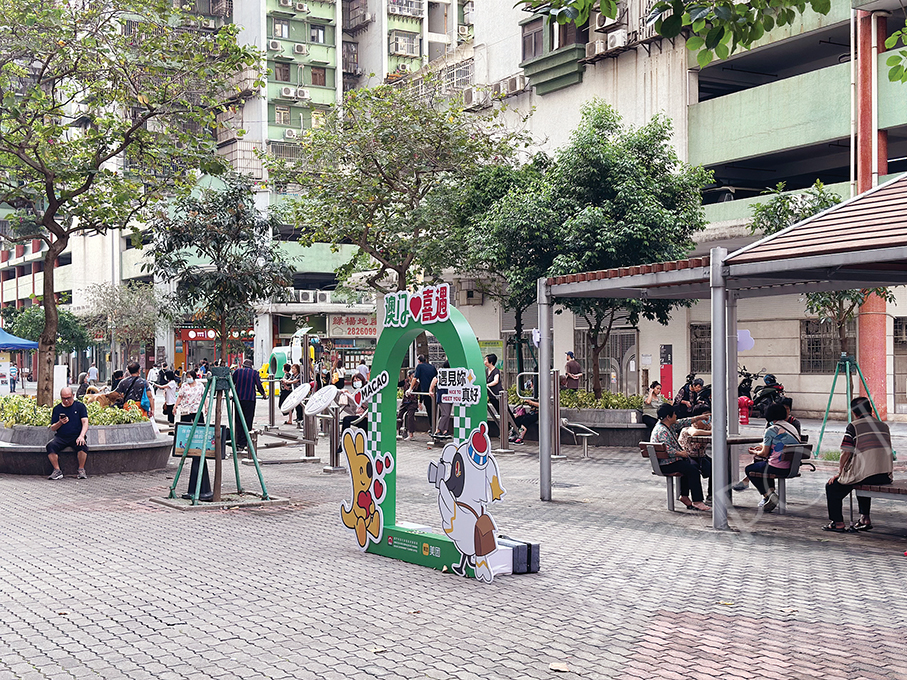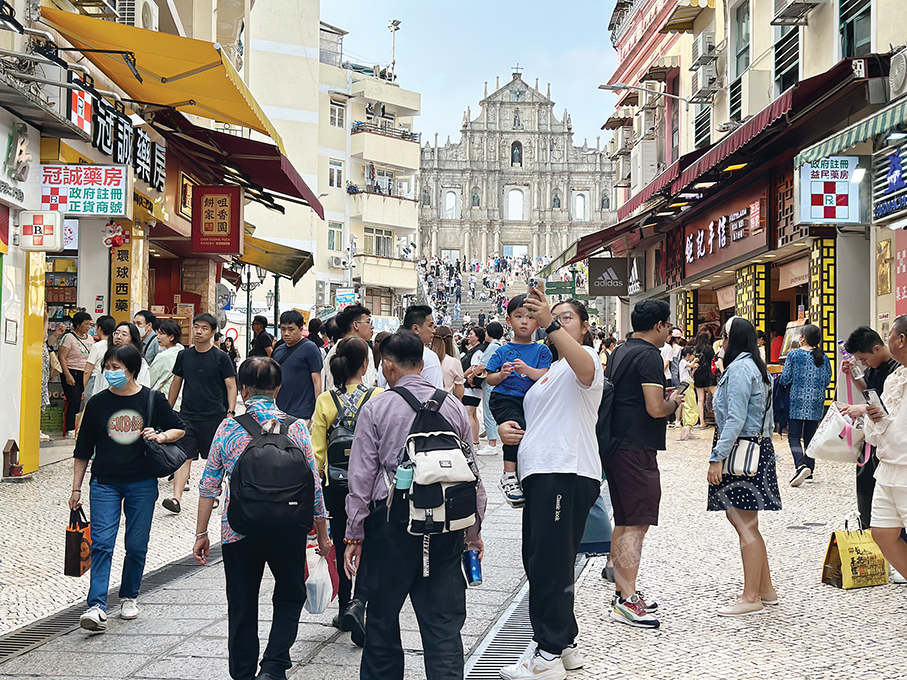Statistics supplied by the Public Security Police (PSP) yesterday show that the number of entries and exits at the city’s nine border checkpoints during the mainland’s Labour Day “Golden Week” from Wednesday to Saturday totalled about 2.43 million, and Industry and Commerce Federation of Macau Central and Southern District President Lei Cheok Kuan pointed out that the tourism district’s business takings had dropped by 30 to 40 percent compared to “normal days”, but Industry and Commerce Association of Macau Northern District President Wong Kin Chong said that his neighbourhood’s business turnover had increased slightly, with the catering sector recording a 10 percent growth in income.
The mainland’s five-day holiday began on May Day and ended last night. According to a PSP statement yesterday, the total number of arrivals and departures at Macau’s border checkpoints between Wednesday and Saturday stood at about 2.43 million, representing an increase of 11.6 percent year on year, with a daily average of 600,000 entries and exits.
With the start of the holiday on May 1, it rained in Macau almost every day, with the local observatory even issuing on Saturday the city’s first Black rainstorm warning signal in three years, the highest of a three-level rain warning system.
On rainy days both residents and visitors, generally speaking, are more likely to stay indoors such as at various resort hotels in Cotai and, therefore, the foot traffic outdoors, such as in the city centre in particular, drops significantly. Talking to the Post yesterday afternoon, the owner of a newspaper stand near a bus stop in Avenida de Almeida Ribeiro said: “The long queues for buses to Taipa were constant for a few days”.
City centre’s business down by 30-40 pct
Lei told the Post in an interview yesterday at his jewellery shop in the Ruins of St Paul’s area that due to the rainy weather, a number of small- and medium-sized enterprises (SMEs) suffered a significant drop in their turnover by 30 to 40 percent: “Foot traffic during the May Day holiday was not bad, but due to the weather, consumers were reluctant to splash out in physical shops, resulting in a decline in turnover for some SMEs, but those who have launched online sales were less affected”.
Consumption patterns in today’s society have changed significantly, with the online virtual economy being the mainstay and the real economy remaining in the doldrums, Lei pointed out, adding that Macau’s real economy was in bad shape, but at the same time, its online economy had yet to be fully developed.
Rainy weather affected businesses during the holiday, but SMEs with online sales channels were able to maintain their income, Lei said. There are currently two major adverse impacts – the import and export of goods and logistics problems, which seriously hamper the development of local SMEs, according to Lei, who urged the government to actively promote the development of online sales, as well as Macau’s logistics and express delivery sectors in the future and, thus, also promote the development of local SMEs. He also called on SMEs to take advantage of the post-May Day off-season to equip themselves for the next peak season, i.e., the summer holidays.
Northern district’s business up 10 pct
Meanwhile, the Macau Government Tourism Office (MGTO) has focused in recent years on promoting the tourism resources and characteristics of the peninsula’s northern district (known in Cantonese as “bak koi”) by introducing itineraries for tourists visiting Fai Chi Kei district, the Barrier Gate and Qingmao checkpoint areas, as well as Iao Hon, Mong Ha and Areia Preta neighbourhoods, complete with various consumption promotion campaigns as well as the placing of several large-scale art installations, in the hopes of leading tourists to visit and spend big in the city’s northern neighbourhoods, thus boosting the community economy there.
Wong told the Post by phone yesterday that due to the almost daily rain during the May Day holiday having resulted in severe traffic congestion in both Macau and the mainland, local residents instead preferred to stay and spend in Macau, rather than in the mainland, for example Zhuhai. Wong also said that although there were fewer visitors than expected, there was, nevertheless, a small increase in business turnover overall, with a 10 percent rise in receipts in the catering sector in particular.
Whilst it was important to support local SMEs, the government should also place special emphasis on improving the public transport system in the northern district, Wong said, suggesting the government provide visitors with shuttle buses to visit the northern district: “On the one hand, it could drive the foot traffic to the northern district from various [traditional] tourism areas such as Nam Van and Rua do Cunha, while on the other hand, it could also make it more convenient for visitors to go on a spending spree in the northern district and return to the mainland via the nearby border checkpoints”.
Also speaking to the Post yesterday, a Thai restaurant owner in Fai Chi Kei district said that his revenue during the holiday was more or less the same as on normal days, and most of his patrons continued to be locals, adding that thanks to a consumption promotion campaign encouraging residents to stay and spend in the northern district, he was enjoying growth in his restaurant’s turnover especially on weekends.

Residents relax yesterday at the Lok Yeong Fa Yuen Building sitting-out area in Fai Chi Kei district, where the Macau Government Tourism Office (MGTO) has launched, together with Meituan – a mainland-based e-commerce service platform – a consumption promotion campaign benefiting the northern district’s SMEs.

Visitors flock to the Ruins of St Paul’s area yesterday, the last day of the mainland’s five-day May Day holiday. – Photos: Yuki Lei







